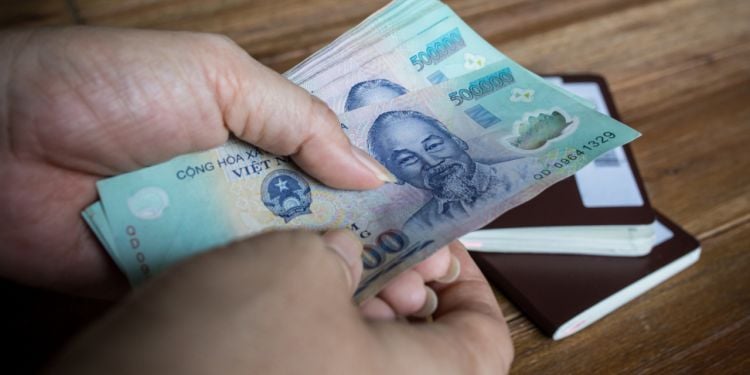
If you have decided to settle in Vietnam, you will definitely need to open a bank account. Not only will this be the easiest way for your salary to be deposited, but you can also pay directly through QR codes at many shops or restaurants. While you are able to open a bank account as an expat in Vietnam, there are a couple of things you need to know first.
How do I open a bank account in Vietnam?
The formalities are quite simple: choose the bank where you want to open your account and inquire about the specific requirements for a foreigner. These may vary according to the bank but will typically include a valid passport and visa, a minimum deposit amount, your residence card, proof of address, and a copy of your work contract. Make an appointment online or simply visit one of the branches of the bank you choose. Banks in Vietnam will have a ticket system, so it's very easy to walk in and speak with someone in a few minutes.
Good to know:
Most bank employees in Vietnam can speak English, or you will be directed to a designated team member.
Types of bank accounts in Vietnam
If you are considering opening a bank account in Vietnam, here is an outline of the bank account styles you will have access to:
- Personal (Current, Chequing, Savings): The chequing or current bank account is the most popular and accessible option. This will grant you a bank account to deposit a salary or transfer funds from abroad. After you open a personal banking account, it will be classified as your “current” or “chequing” account. If you choose to also open a separate savings account, certain banks may have promotions on interest rates to help grow your money while living in the country.
- Business: A business bank account will be specific to an expat who has a business or is an investor in a local business. This will be managed by an accountant or categorized specifically for taxes and income receipts.
- Foreign currency: These accounts are not eligible to receive VND and are used to receive primarily deposits of VND, USD, AUD or EUR. The State Bank of Vietnam (SBV) regulates foreign currency accounts to ensure compliance with national financial policies. Foreign investors are typically required to open a foreign currency bank account upon entering the Vietnamese market, especially if they intend to remit profits to their home countries. Banks that offer foreign currency accounts are Techombank, HSBC, DongA Bank, Asia Commercial Bank (ACB), and Bank for Investment and Development of Vietnam (BIDV).
- Time deposit: This is also known as a fixed-term bank account and is primarily used to invest and grow your savings. This account should only be opened if you guarantee you will be in the country for the duration of the fixed term. Banks that offer this service include HSBC (eligible currency includes VND, USD, EUR, GBP, AUD, CAD, JPY, SGD, HKD) fixed term length 1 week to 36 months, Shinhan Bank (eligible currency includes VND, USD, EUR, JPY, AUD, GBP, CAD, SGD, NZD) fixed term length ranges from 1 week to 36 months, and Standard Chartered Bank (eligible currency includes VND, AUD, GBP, EUR, SGD, USD) fixed term length ranges from 1 week to 12 months.
Conditions for opening a bank account in Vietnam
Many expats in Vietnam prefer a Vietnamese bank account to help track spending and saving. With apps such as TransferWise or Xoom, you can easily deposit money from your overseas account to your local bank.
To open a foreign currency bank account in Vietnam, you need a minimum amount as stipulated by the specific bank you choose. Initial deposit amounts vary between banks, but ACB, for instance, accepts as little as 100,000 VND (3.91 USD). It is recommended to keep a minimum amount greater than 50,000 VND (1.96 USD) in your account. Otherwise, you may be subject to a penalty.
Good to know:
- Some banks may take a commission for withdrawals in foreign currencies.
- No commission is charged for withdrawals in VND.
- You likely will have to pay a tax credit if you close your bank account in less than a year.
Some of the most trusted banks in the country include VietinBank and Vietcombank. International banks such as HSBC and Citibank have a big presence in the major cities.
As of January 1, 2025, each person with a bank account in Vietnam needs to keep an updated biometrics report attached to their account. This means that if you have been let go from your employer or changed visa status, you may lose access or have the account suspended and closed.
Timo Bank opens accounts for foreigners on a tourist visa, which you can continue to update each time your visa is renewed. Be aware that the account will quickly become unavailable once your visa has lapsed.
Payment options in Vietnam
Each bank account will issue a debit card to the owner. You can now use this card to withdraw money from an ATM, which is easily accessible around Ho Chi Minh City or Hanoi but less available in smaller cities.
The primary method of payment in Vietnam is QR transfer. You can pay for almost anything from your cell phone, and the money comes directly from your bank account. While we recommend carrying a little cash on you at all times for emergencies, you can easily pay for groceries, meals, coffee, and transportation via the QR payment system.
Credit cards in Vietnam
If you are looking to obtain a credit card in Vietnam, each bank has its own process and regulations. Anyone on a tourist visa cannot apply for a credit card, but if you are on a temporary residence visa (TRC), banks like HSBC and BIDV will be happy to assist you.
Money transfers outside of Vietnam
Specific conditions apply when transferring money to a foreign bank. You will need to produce official documents justifying the transaction, for example, the sale of property, transfer of a portion of your salary, or funding children's education abroad.
Currency exchange in Vietnam
Vietnam has strict regulations governing foreign currency transactions. While many travelers and locals have historically used gold shops for convenience, doing so without government authorization is technically illegal. The legal basis for this is Decree 88/2019/ND-CP, which outlines penalties for unauthorized currency exchange and specifies the legal ways to exchange money in Vietnam.
Penalties for unauthorized currency exchange
Under Decree 88/2019/ND-CP, which came into effect on December 31, 2019, individuals and businesses involved in illegal currency exchange can face serious administrative penalties. These include transactions made at unauthorized gold shops or any institution lacking a license from the State Bank of Vietnam.
If the amount exchanged is under USD 1,000, the violator typically receives a formal warning. For amounts between USD 1,000 and 10,000, fines range from VND 10 million to 20 million (approximately USD 420–840). Exchanges between USD 10,000 and 100,000 incur fines of VND 20 million to 30 million (USD 840–1,260). For transactions over USD 100,000, the highest penalty applies: VND 80 million to 100 million (USD 3,360–4,200).
Additional sanctions may include confiscation of the foreign currency involved and steeper fines for repeat violations. Businesses such as unlicensed gold shops face double the fines applied to individuals. These penalties are not hypothetical—there have been multiple reports of individuals being fined after exchanging money at non-authorized gold shops, prompting stronger enforcement of the law.
Legal alternatives for currency exchange in Vietnam
Despite these restrictions, there are clear, lawful options for exchanging foreign currency in Vietnam. To avoid fines and ensure a legal transaction, you should only use licensed service providers.
The most reliable option is to go through commercial banks. All major state-owned and private banks in Vietnam are authorized to perform currency exchange. These include Vietcombank, BIDV, VietinBank, and Techcombank. Banks offer transparent exchange rates, official receipts, and legal protection. Most have branches in city centers, airports, and tourist areas, making them highly accessible.
Another legal option is to use licensed exchange agents, including certain hotels, tourist businesses, and a limited number of gold or jewelry shops that have obtained a special permit from the State Bank of Vietnam. These establishments are required to display a visible license or show their partnership with an authorized bank, along with clearly posted exchange rates.
Some well-known areas where you can find licensed exchange counters include Hà Trung Street in Hanoi, and Lê Thánh Tôn and Lê Văn Sỹ Streets in Ho Chi Minh City. These locations feature several gold shops that are authorized to handle foreign currency. If you're unsure whether a shop is licensed, ask to see its exchange license or proof of affiliation with a bank. If that's not available, it's best to walk away.
Useful links:
We do our best to provide accurate and up to date information. However, if you have noticed any inaccuracies in this article, please let us know in the comments section below.










